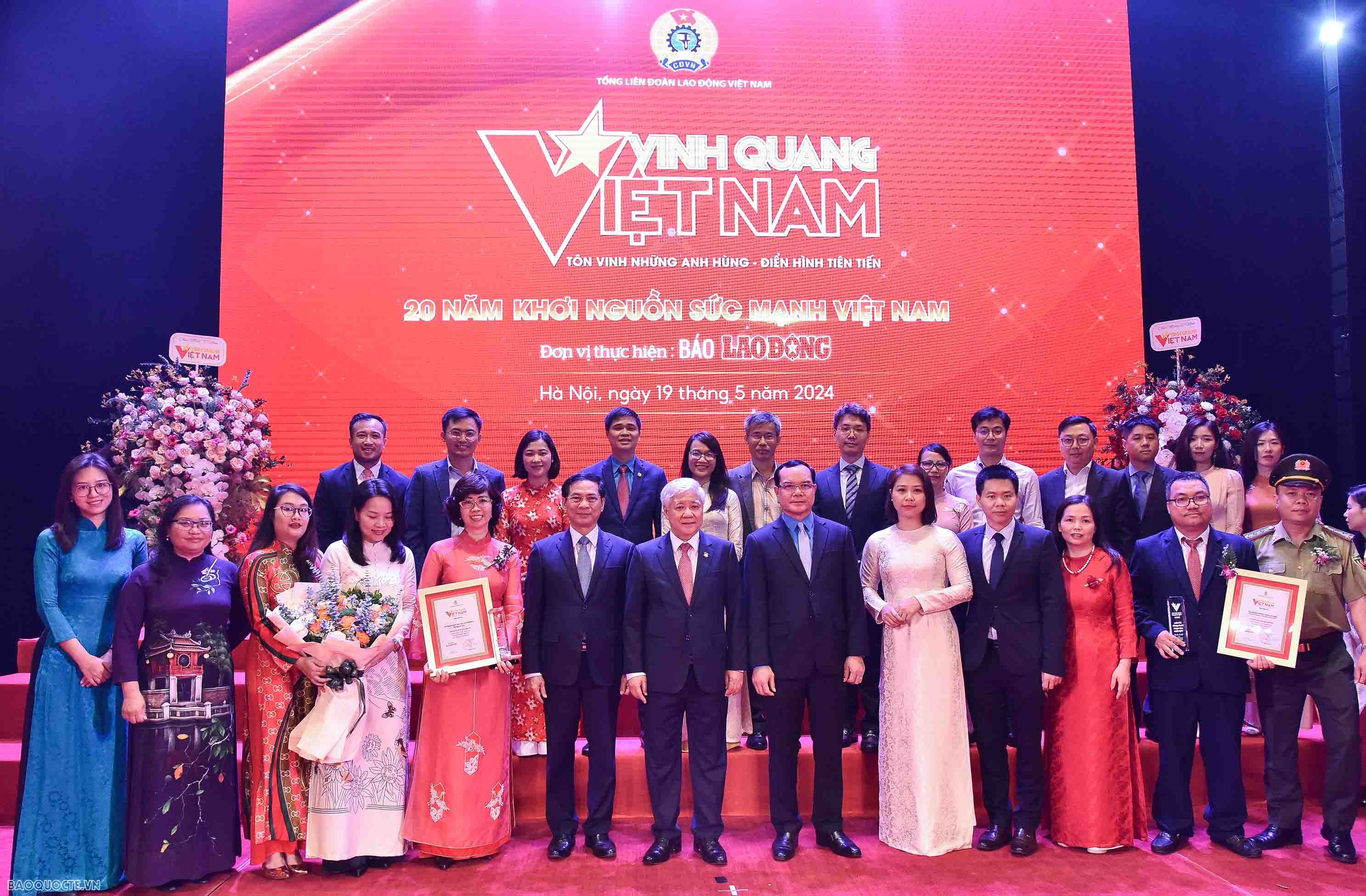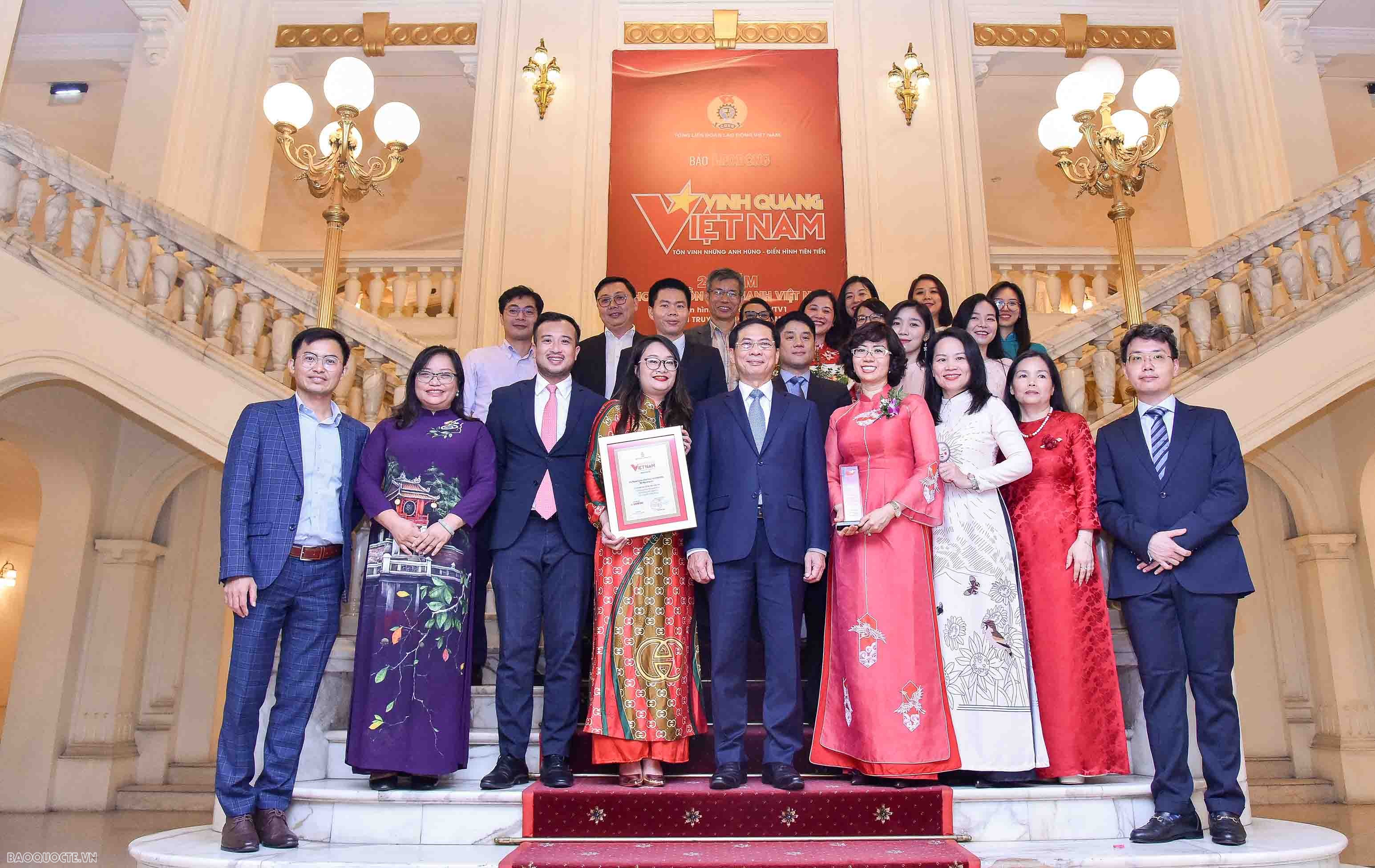
Cultural diplomacy: Behind the success story
Latest
 |
| Mr. Do Van Chien, Chairman of the Central Committee of the Vietnam Fatherland Front, and Mr. Nguyen Dinh Khang, Chairman of the Vietnam General Confederation of Labour, award a plaque and certificate of merit to representatives of the Cultural Diplomacy and UNESCO Department - Ministry of Foreign Affairs. (Photo: Nguyen Hong/WVR) |
Looking back at a journey with many efforts and "sweet fruits," Acting Director General of the Department of Cultural Diplomacy and UNESCO Le Thi Hong Van affirms that joy and pride always come with great responsibilities ahead, to continue to enhance the strength of cultural diplomacy in new situations...
In recent times, the Cultural Diplomacy and UNESCO Department has actively advised and implemented the Cultural Diplomacy Strategy until 2030. What are the most outstanding results in this work?
As the main unit in advising and pushing the implementation of the Cultural Diplomacy Strategy until 2030 issued by the Prime Minister (11/2021), the Cultural Diplomacy and UNESCO Department closely coordinates with other units in the Ministry and 94 Vietnamese Diplomatic Missions abroad, as well as committees, ministries, localities, and businesses to effectively deploy the strategy.
We are delighted that in nearly three years, cultural diplomacy has truly become a common task of the entire political system, systematically and broadly deployed, achieving meaningful results.
At the international level, the task of proactive and extensive integration in the cultural field at regional and international organizations, especially at UNESCO, has obtained many achievements. We are currently playing a role in five of the seven most important governing mechanisms of UNESCO, including three Vice-President roles, marking a historic milestone in nearly 50 years of our participation in this organization, creating a "Vietnam phenomenon" as assessed by other countries at UNESCO.
This has great significance in many aspects, affirming the sound foreign policy of the Party and State about multilateralization, diversification, and comprehensive, deep, and effective international integration, promoting and elevating multilateral diplomacy, as the spirit of the Resolution of the XIII National Party Congress, Directive No. 25-CT/TW of the Central Committee and the Cultural Diplomacy Strategy until 2030. These achievements also prove the increasingly high international status and reputation of Vietnam, and the international community's trust in our capacity to contribute and manage at global multilateral institutions.
At the national level, cultural diplomacy, especially high-level diplomacy, has made significant marks, such as the image of General Secretary Nguyen Phu Trong enjoying tea and holding discussion with General Secretary and President of China Xi Jinping, our Prime Minister presenting calligraphy to the Prime Minister of Japan, etc. These events demonstrate cultural depth, contributing to enhancing political trust with partners.
At the local level, many cultural diplomacy activities, international events, and festivals have been and are positioning the "brand" of localities, attracting friends and international tourists. The task of advocating for UNESCO titles by 2030 has exceeded the target of 60 titles as outlined in the Strategy, reaching a total of 68. These heritages and titles contribute to protecting, honoring distinctive cultural values, and also becoming models for sustainable economic and social development, improving the livelihoods of the people. The active participation of mass organizations, businesses, and people at home and abroad creates a combined strength in deploying cultural diplomacy.
It can be affirmed that the deployment of the Cultural Diplomacy Strategy in recent times has achieved four notable accomplishments: Contributing to honoring the intellect, qualities, and noble ideals of the Vietnamese people, especially President Ho Chi Minh and UNESCO dignitaries; Strongly promoting the image of the country and its people; Enhancing the cultural value of Vietnam internationally and promoting soft power, while simultaneously absorbing the cultural quintessence of humanity, to make culture truly the spiritual foundation, an internal resource, and a breakthrough force for economic and social development and international integration; Contributing to the elevation of multilateral diplomacy and enhancing Vietnam's reputation and position on the international stage.
 |
| The Cultural Diplomacy and UNESCO Department was honored at the 2024 Vietnam Glory programme on May 19. (Photo: Nguyen Hong/WVR) |
Could you share a success story in lobbying UNESCO nomination files, as well as effectively mobilizing resources for economic and social development, enhancing local and national brands?
Vietnam currently owns 68 UNESCO titles. These UNESCO titles are very "prestigious," embodying national characteristics but with global value, even human heritage. These titles have great potential in transforming growth models, promoting sustainable development, enhancing local promotion, and improving the national image.
Vietnam is considered by UNESCO Director-General Audrey Azoulay as a "model example" of harmonizing between heritage conservation and promotion, linked to sustainable tourism development, economic development, and improving the livelihoods of the people.
It can be seen that 68 titles are 68 stories about building nomination files, lobbying for recognition, and 68 stories about obstacles and challenges at various forms and levels.
Let me take a recent example of Ha Long Bay – Cat Ba Archipelago, which has just been recognized as a world heritage site during the Red Flamboyant Flower Festival in Hai Phong on May 11, 2024.
I still vividly remember the overwhelming joy of the entire Vietnam delegation seven months ago when the Chairman of the World Heritage Committee gavelled at the recognition of Ha Long Bay - Cat Ba Archipelago as a natural world heritage.
This is not only the pride of the people of Hai Phong city and Quang Ninh province but also the shared joy of the country, as the name of Vietnam was once again called on the world heritage map after eight years. This also reflects the international recognition and appreciation for the beauty of the heritage and the efforts of Vietnam in protecting heritage, enriching the cultural treasury of humanity.
It is known that the process of building this file lasted nearly 10 years (since 2013) with not a few difficulties such as choosing criteria to highlight the global value of the heritage, consensus between two localities, and the mechanism for conservation and joint management of heritage?
Before the World Heritage Committee's session to review the file (September 2023), the International Union for Conservation of Nature – an advisory agency of UNESCO, recommended returning the File for a new nomination.
Starting from the desire to protect and promote the best heritage values for future generations, the Vietnam delegation with the participation of leaders of Hai Phong city and Quang Ninh province, the Vietnamese Ambassador to UNESCO, representatives of the Ministry of Foreign Affairs, Ministry of Culture, Sports and Tourism, conducted nearly 30 meetings directly with 21/21 member countries of the World Heritage Committee, the World Heritage Center, the International Union for Conservation of Nature to share viewpoints, clarify the outstanding global values of the heritage, affirm the efforts and commitments of the governments, people of the two localities, and of Vietnam in protecting heritage.
Our determined efforts to conserve heritage have convinced the advisory bodies, international experts, and 21 members of the World Heritage Committee to fully support the recognition of the heritage.
This success is just the beginning. We will continue to accompany the localities to fulfill the responsibilities and commitments when recognized, to preserve and promote the value of the heritage according to the spirit of the World Heritage Convention and serve sustainable development of the country.
 |
| Foreign Minister Bui Thanh Son takes a commemorative photo with the Cultural Diplomacy and UNESCO Department team. (Photo: Nguyen Hong/WVR) |
What about the "Vietnam phenomenon" with important roles in the most critical governing mechanisms of UNESCO, how do you evaluate this success?
The recent historic milestones in Vietnam's multilateral diplomacy at UNESCO not only affirm the pioneering role of its diplomacy but also continue to demonstrate its soft power and national status.
The experiences, knowledge, and efforts of Vietnam in preserving, protecting, and promoting the value of cultural heritages at both theoretical, legal, and practical aspects are welcomed by many countries, wishing us to share, replicate, and contribute to the effective and practical implementation of cultural conventions. UNESCO leaders and international friends remark that Vietnam is the answer to many complex issues of the modern world.
This is also a good opportunity to promote cooperation between Vietnam and UNESCO, utilizing ideas, initiatives, and resources of UNESCO to open new development spaces for Vietnam, contributing to enhancing the spiritual life of society, creating a favorable basis for our country to achieve the sustainable development goals set out.
Although cultural diplomacy activities have been further expanded and diversified, according to you, how should this work be dealt with and invested in to meet the demands in the new situation?
The next 2-3 years are crucial for the comprehensive, coordinated process of innovation and international integration. To continue implementing the tasks set by the 13th Party Congress, which is "to further promote cultural diplomacy to vigorously promote the national image and enhance the comprehensive strength of the country," the Cultural Diplomacy Strategy until 2030, the results of the National Cultural Conference in 2021, and the 32nd Diplomatic Conference, I believe we need to continue our efforts, being proactive, positive, and creative in carrying out the following five tasks:
First, continue to thoroughly understand, adhere to, and effectively implement the directions and policies of the Party and State on cultural development and cultural diplomacy, to promote the role of culture as the "soul of the nation." Draw on cultural strength as an internal resource and significant force for rapid and sustainable national development. Consider investing in culture as investing in development, with cultural policy serving as a powerful lever for national actions.
Second, continue to promote the cultural values and image of the country and its people, focusing on spreading the values, ideologies, and advanced and noble worldview of the Vietnamese nation, especially through the image and values of President Ho Chi Minh and the dignitaries recognized by UNESCO.
Third, further integrate cultural diplomacy activities with political diplomacy and economic diplomacy within a comprehensive, modern diplomacy that retains the distinct identity of the "Vietnamese bamboo tree."
Fourth, in the context of the Industrial Revolution 4.0, cultural diplomacy needs to quickly adapt to new human knowledge, maximizing resources for sustainable national development, especially in priority areas such as the development of the cultural industry, creative industries, international cooperation in science and technology, and education and training. It is necessary to enhance the combination of cultural soft power with communication strategies to increase the overall national strength.
Fifth, continue to perfect the institutions, policies, and coordination mechanisms for cultural diplomacy in a systematic, coherent, and interconnected manner to mobilize social resources. Encourage the participation of ministries, localities, enterprises, organizations, and the people, with the Government playing a central role in implementing state-level cultural diplomacy activities, both regional and international; the ministries, branches, and localities leading the organization of cultural diplomacy activities within the scope of their functions and tasks; corporations and enterprises playing a key role in investing in the cultural and creative industries. Additionally, encourage the people, especially the overseas Vietnamese community, to actively contribute to spreading Vietnamese cultural values.
Thank you very much!












